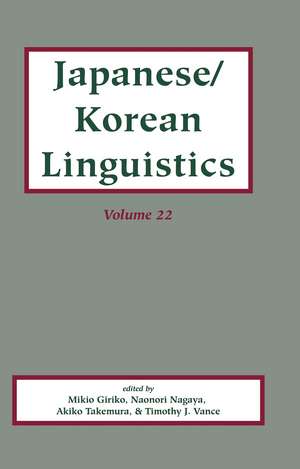Japanese/Korean Linguistics, Volume 22: Stanford Linguistics Association
Autor Mikio Giriko, Naonori Nagaya, Akiko Takemura, Timothy J. Vance, Timothy Vanceen Limba Engleză Paperback – 16 mar 2015
Japanese and Korean are typologically similar, with linguistic phenomena in one often having counterparts in the other. The Japanese/Korean Linguistics Conference provides a forum for research, particularly through comparative study, of both languages. The papers in this volume are from the twenty-second conference, which was held at the National Institute for Japanese Language and Linguistics. They include essays on the phonology, morphology, syntax, semantics, historical linguistics, discourse analysis, prosody, and psycholinguistics of both languages. Such comparative studies deepen our understanding of both languages and will be a useful reference for students and scholars in either field.
Preț: 181.44 lei
Preț vechi: 217.00 lei
-16% Nou
Puncte Express: 272
Preț estimativ în valută:
34.73€ • 37.74$ • 29.19£
34.73€ • 37.74$ • 29.19£
Carte indisponibilă temporar
Doresc să fiu notificat când acest titlu va fi disponibil:
Se trimite...
Preluare comenzi: 021 569.72.76
Specificații
ISBN-13: 9781575867519
ISBN-10: 1575867516
Pagini: 400
Dimensiuni: 166 x 226 x 23 mm
Greutate: 0.57 kg
Editura: Center for the Study of Language and Information
Seria Stanford Linguistics Association
ISBN-10: 1575867516
Pagini: 400
Dimensiuni: 166 x 226 x 23 mm
Greutate: 0.57 kg
Editura: Center for the Study of Language and Information
Seria Stanford Linguistics Association
Notă biografică
Mikio Giriko is a researcher at the National Institute for Japanese Language and Linguistics. Naonori Nagaya is a lecturer in the Institute of Global Studies at the Tokyo University of Foreign Studies, Japan. Akiko Takemura is an associate researcher at Kobe University, Japan. Timothy J. Vance is professor in the Department of Linguistic Theory and Structure at the National Institute for Japanese Language and Linguistics. He is the author of An Introduction to Japanese Phonology, Instant Vocabulary through Prefixes and Suffixes, editor of Kodansha’s Romanized Japanese-English Dictionary, and coeditor of Japanese/Korean Linguistics, Volume 14.
Cuprins
- Acknowledgements
- The Adaptation of Contemporary Japanese Loanwords into Korean
Chiyuki Ito and Michael Kenstowicz - The Phonology of Emphatic Morphology in Japanese Mimetics
Kazutaka Kurisu - Rendaku Lovers, Rendaku Haters, and the Logistic Curve
Mark Irwin
- A Judgement Study on Aspectual Diagnostics in Japanese
Kentaro Nakatani and Natsuno Aoki - Inferring Verb Meanings from Syntactic Frames by Japanese 2-Year-Old Children: An Experimental Approach Using an IPL Paradigm with a Dialogue Phase
Tessei Kobayashi and Takaaki Suzuki - The Tensed-S Condition (TSC) and the Determination of the Binding Domain of Anaphors in Korean
Ji-Hye Kim and James H. Yoon - An Experimental Investigation of Online and Offline Binding Properties of Korean Reflexives
Eunah Kim, Myeong Hyeon Kim, and James Yoon
- Some Korean/Japanese Linguistic Implications of Korean Wooden Tablet Writings
SeungJae Lee - How Adessive Becomes Nominative in Korean Honorifics
Alan Hyun-Oak Kim - A Discrepency in the Degree of Grammaticalization of Korean and Japanese Negative-Sensitive Items: A Corpus-Based Study
KangHun Park - Distributional Patterns of Syntactic and Semantic/Pragmatic Coding in Four Japonic Varieties
Shoichi Iwasaki and Noriko Yoshimura - A Quantitative Approach to Mimetic Diachrony
Kimi Akita, Satoshi Nakamura, Takanori Komatsu, and Sachiko Hirata-Mogi
- Territories of Thoughts in Korean Conversation
Mary Shin Kim - Japanese Relative Clauses That Stand Alone
Yoshiko Matsumoto - Korean Discourse and Identity: Lessons from Heritage Language Research
Agnes Kang
- 1-Deletion: Measure Nouns vs. Classifiers
Akira Watanabe - Korean Nominative Case-Stacking: A Configurational Account
Theodore Levin - Multiple Accusative Constructions: The Case of V+tate in Japanese
Mika Kizu, Peter Sells, and Hidekazu Tanaka - A Corpus-Based Analysis of Adverbial Uses of the Quotative TO Construction: Speech and Thought Representation without Speech or Thought Predicates
Seiko Fujii - Japanese Passives with Verbal Nouns
Yutaka Sata - Dual Selections and Relabeling in Japanese and Korean
Toru Ishii - Alternatives Tell You Where You Are
Yoshiyuki Shibata - Genetive Modifiers: ga/no Conversion Revisited
Masayoshi Shibatani, Sung Yeo Chung, and Bayaerduleng
